State School Innovator Voice 1
Mike Fairclough – Head Teacher at West Rise Junior School
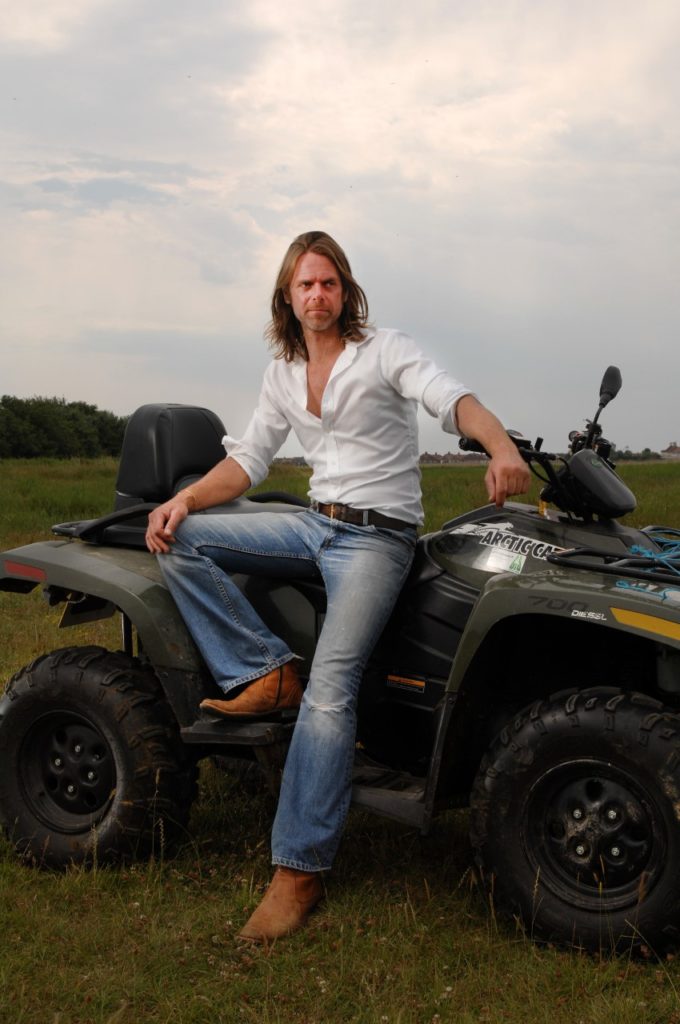
Mike Fairclough has been in the teaching profession for 25 years. He is the author of Playing with Fire: Embracing risk and danger in schools and is the head teacher at West Rise Junior School in East Sussex.
Named “Primary School of the Year” by the Times Educational Supplement (2015) and described as “a beautiful school community” by Sir Ken Robinson, West Rise is a Rights Respecting School which aims to place the articles of the United Nations Convention on the Rights of the Child at the heart of all school policy. You can watch this short film which gives an introduction to life at Fairclough’s school:
How does your school innovate and what sets your school apart from other mainstream schools?
ROOM 13
16 years ago I set up a student led art studio at the school, known as “Room 13”. Taking its name and ethos from the original Room 13 in Scotland, the studio is located in a detached house on the school grounds.
There is a committee of children who run the studio, hiring artists in residence, facilitating arts projects and communicating with the wider school. Children from the rest of the school then access the art studio where they have complete creative autonomy. They are able to be inspired and influenced by the artist in residence, but they choose what to do. This might be sculpture, painting, digital art, performance etc.
The ethos of Room 13 permeates the wider work of the school. There is usually a school project, led by Room 13, which operates throughout the academic year. Currently, the project is an Arts Council funded experience with some artists from neighbouring Brighton. The project involves the children engaging with the school’s extensive outdoor learning environment, using sculpture and film. The objective of the project is to enable the children to engage with the natural world in unconventional ways and therefore expand their understanding and experience of it.
A parallel project is one which we are working on with The Eden Project’s co-founder, Sir Tim Smit. The project’s ambition is to facilitate the creation of an Eden Project in Eastbourne, where the school is situated. The children have been learning alongside local archaeologists and historians to explore the locality’s rich history and stories and to turn this into a massive collective painting.
THE MARSH
Adjacent to the main school site is an area of 120 acres of marshland, which is leased from the Local Authority by the school. We have used this land for the last twelve years.
“The Marsh” as we call the habitat, is on the site of a late Bronze Age settlement. Many of the activities which the children engage in on The Marsh are linked to this period in history. The children have helped build a replica Bronze Age roundhouse and learn Prehistoric skills, such as smelting tin and copper to make bronze, flint knapping and other crafts.
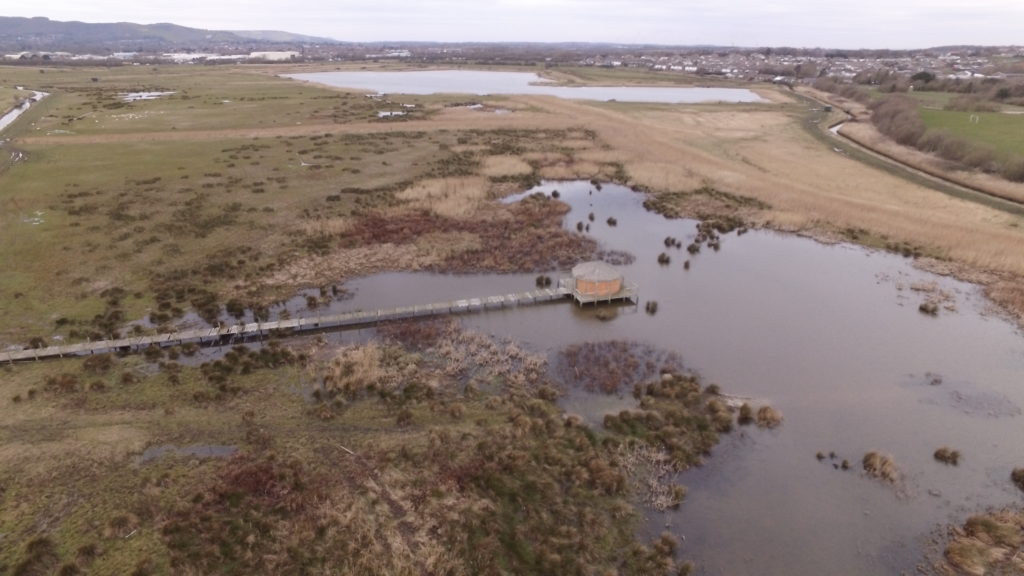
Shortly after obtaining the land, we purchased a small herd of Asian water buffalo, which resemble the now extinct auroch, which used to roam freely in the area during the Bronze Age. These have become mascots for the school and can often be found wallowing in the large lake, next to where the children carry out their work. We also have a flock of sheep on the marsh.
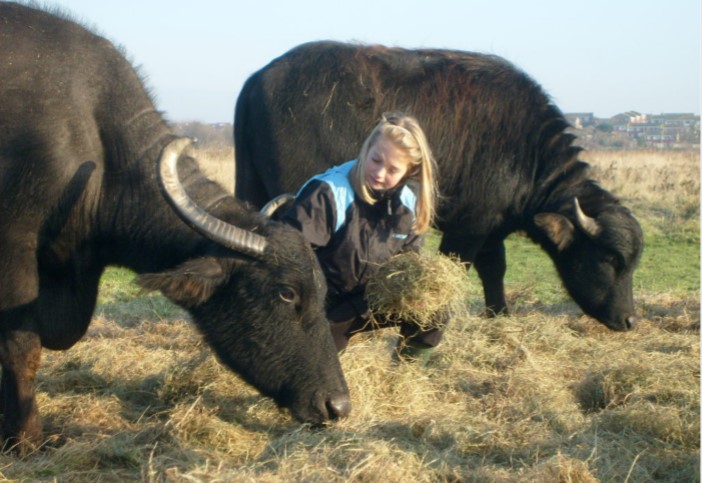
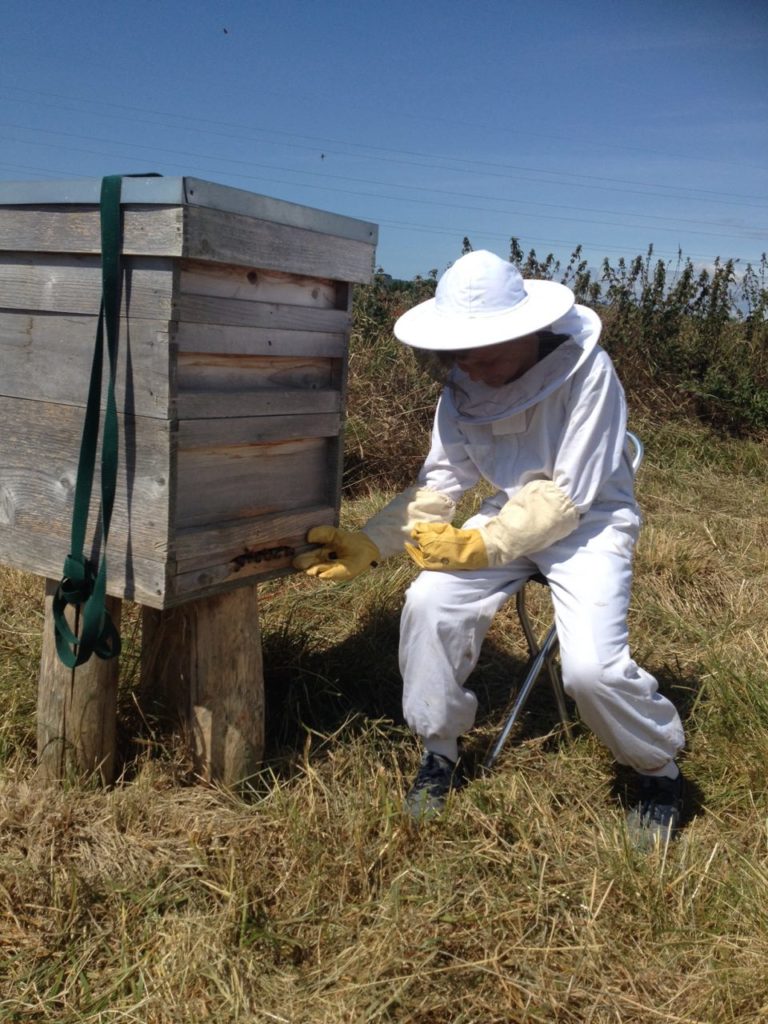
Having such a wild and large outdoor space means that the school can facilitate activities which would otherwise be difficult to deliver.
On the far side of The Marsh, the children learn beekeeping, suiting up in protective clothing and inspecting the school’s beehives with trained beekeepers.
Next to the apiary is a reptile sanctuary, where hundreds of grass snakes, common lizards and slow worms were released into the area, from a nearby housing development last year. The children have learned about and handled the creatures, under the guidance of local naturalists, who are connected to the school.
FOREST SCHOOL
West Rise delivers a successful Forest School provision throughout the year to all of our children. This involves the children learning to light a fire and cook over an open fire. The children learn green woodworking skills, they forage for edible and medicinal plants, and engage in bird watching on The Marsh. Due to the untouched nature of the habitat, there are species of beetle and spiders which have an unbroken lineage in the area since Prehistoric times. Again, experts in the field of insect life, including eminent biologists, teach the children about these rare species in a hands on way.
POSITIVE PSYCHOLOGY
Four years ago, I was introduced to the field of Positive Psychology. Working with the school’s Educational Psychologist, we delivered several action research projects, which explored this area of psychology, in an attempt to introduce the ethos and benefits of it to the school community.
The main concept to emerge from these studies was the aspect of character education and Positive Psychology character traits. Over the years, the children have learned about and enhanced within their own being the traits of resilience, teamwork and gratitude, among others. Through engaging with this area of psychology, the staff and pupils have been able to frame and to make sense of the tangible benefits of some of our innovative projects, in light of what we have learned. For example, out on The Marsh, the children will light fires and cook over an open fire in sub-zero temperatures and in the driving rain. In doing so, they inevitably build their grit and resilience and enhance their team working skills. These traits, when observed within the children, are then celebrated in assemblies and with the wider school community. We have found that this has then promoted and magnified these important character traits within the children and their peers, particularly during challenging times. Consequently, reports of anxiety within the children have diminished as their resilience has improved.
Why are you interested in progressive education?
Ever since I became a primary school teacher in 1995, I have felt that a creative approach to education, and one which puts the child at the centre of their learning, enables children to make the most progress, academically, emotionally and in relation to their personal development.
Authors and speakers, such as Professor Bill Lucas, Guy Claxton and Richard Gerver, among many others, have demonstrated through rigorous research, that progressive education leads to success on many levels within the individual pupil. They also demonstrate that within an ever changing and challenging world, the character traits and skills, which are acquired through a creative and child centred approach to learning, are the things which enable children to succeed and thrive, ultimately enabling the child to grow into a well-rounded and happy adult.
In your opinion what are the main challenges of our current state school system?
The current school system is far too bound to the political system. I have seen thirteen consecutive people perform the role of Secretary of State for Education and four different governments come and go, since qualifying as a teacher. Each one has rebranded education in some way and none of them have appeared to have drawn on the endless wealth of academic research into what constitutes good education, or a good education system as a whole.
Over testing dominates the education landscape, with no tangible evidence of its benefit. This has created a restrictive accountability system, gripped by fear of reprisals, again with no obvious benefit to children or their teachers.
The current system is based on a Victorian model of control during the post-industrial age. It is out of date and no longer relevant. It appears to be very knowledge heavy (although the whole skills vs knowledge debate is unhelpful) and it seems to be more about remembering “stuff” for an exam, rather than educating the whole being for the benefit of the individual and society as a whole.
If you could make changes to the state education system, what would be your top priorities?
- Scrap testing for all primary aged pupils.
- Create an alternative to GCSEs, which are currently too restrictive.
- Ensure that education policy is driven by research and has the whole child at its heart.
- Remove education from the domain of politics and politicians. Changing the entire system every time there is a change of government, and to an extent with every new Secretary of State for Education, is damaging to the education of our children and to society as a whole. An independent governing body with the likes of Bill Lucas and Richard Gerver serving on it, as well as representatives from the arts, sciences and the business world, would provide rigour, as well as consistency, in order to deliver a relevant and world class education system.
Do you have any advice for other schools wishing to implement progressive, innovative practices within the state system?
Organisations such as The Whole Education Network, The Centre for Real World Learning, initiatives such as Spirals of Inquiry and scientific fields, such as Positive Psychology, are great starting points for inspiration. Visiting other settings which are inspiring, and engaging with education forums online, are also very helpful.
Ultimately, at the time of writing, no government or higher authority is necessarily going to give anyone “permission” to adopt progressive practices within the state system. Sometimes, the only way to deliver progressive practices is to have the courage to try them out, without seeking permission. By design, this also means that taking calculated risks and embracing mistakes becomes a necessary part of the process.
Finally, an overriding sense of positivity and optimism for the future need to be the mind-set which educators adopt. In time, the work and ambition for a more meaningful and relevant form of education will prevail, both within the individual setting and throughout the education system as a whole.
Follow Mike Fairclough
You can follow Mike and West Rise Junior School on Twitter at https://twitter.com/westrisejunior
Further Reading
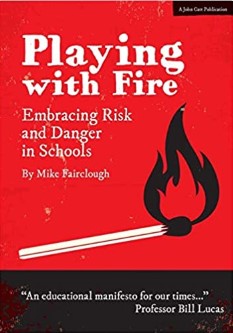
Fairclough’s first book, Playing with Fire: Embracing risk and danger in schools describes the journey of West Rise Junior School and tells the reader how to embrace risk and danger in schools and why this is beneficial.
Fairclough has also written the following articles for the Times Educational Supplement:
If Ofsted told us to jump off a cliff, would we?
Ofsted and the DfE give us instructions, and we submissively obey them. Why aren’t we calling them out for their contradictions, asks Mike Fairclough. Read more…
Proof positive that fixating on ‘anxiety’ won’t fix things
My school asked staff to identify six positive character traits that we felt would benefit pupils and teachers – and they now inform everything we do, to the benefit of all. Read more…
Make journeying outside your comfort zone a habit
While this headteacher doesn’t always enjoy these times, they often result in his greatest professional development. Read more…

